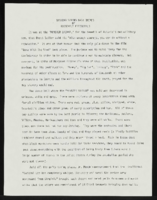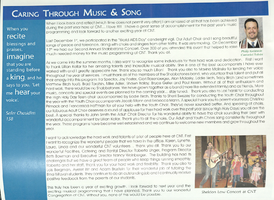Search the Special Collections and Archives Portal
Search Results

Katrina Sandigo oral history interview: transcript
Date
Archival Collection
Description
Oral history interview with Katrina Sandigo conducted by Nathalie Martinez and Barbara Tabach on August 28, 2020 for the Latinx Voices of Southern Nevada Oral History Project. Katrina talks about her family's history and her grandfather's immigration to the United States from Nicaragua. She discusses her education and her time spent studying at the University of Nevada Las Vegas (UNLV) and her work with the Clark County School District (CCSD). She is currently the Education Director for Nevada's Anti-Defamation League (ADL). Katrina also shares her religious faith and how she is active in the Jewish community of Las Vegas.
Text

"Bashing Spring Bash Themes": article draft by Roosevelt Fitzgerald
Date
Archival Collection
Description
From the Roosevelt Fitzgerald Professional Papers (MS-01082) -- Drafts for the Las Vegas Sentinel Voice file. On the Allied Arts Masque Ball "Gone With the Wind" theme.
Text
Fercos Family Publicity Collection
Identifier
Abstract
The Fercos Family Publicity Collection (approximately 1978-1989) contains newspaper articles, advertisements, and a poster promoting the Flying Fercos, a family of juggling and acrobatic performers who performed in Las Vegas, Nevada at the Dunes Hotel during the 1970s and 1980s. The materials document the Fercos family's act as part of producer Frederic Apcar's shows such as
Archival Collection
Jack Anderson Professional Papers on Operation Life
Identifier
Abstract
Materials in this collection (1969-1989) document various endeavors of the Operation Life organization. They include original correspondence, meeting minutes, news clippings, medical programs, grant applications, legal and financial documents, brochures and pamphlets, and other materials that provide context on the kinds of services provided by Operation Life. These files were kept by Jack Anderson in the course of his work as attorney for Operation Life.
Archival Collection
Hughes Aircraft Company Weapons System Publications
Identifier
Abstract
The Hughes Aircraft Company Weapons System Publications (approximately 1965-2011) contain brochures, booklets, photographs, and illustrations of the AWG-9/Phoenix Air Superiority Weapon Control System developed by Hughes Aircraft Company Aerospace Systems Division based in California. The collection contains photographs of various aircraft, as well as a Supersonic Naval Ordnance Research Track (SNORT) test at the Naval Ordnance Test Station near China Lake, California.
Archival Collection
Katherine L. Rankin oral history interview
Identifier
Abstract
Oral history interview with Katherine L. Rankin conducted by Claytee D. White on June 16, 2014 for the Boyer Early Las Vegas Oral History Project. In the interview, Rankin discusses her childhood, her move to Las Vegas, Nevada, and her career as a librarian. Rankin talks about how she began her library career on the Gila River Reservation in Arizona before accepting a position as an audio and visual materials cataloger at University of Nevada, Las Vegas (UNLV) in the 1970s. Rankin later describes her work with the American Library Association, getting tenure at UNLV, and her role as a map cataloger in UNLV Special Collections and Archives.
Archival Collection

Mabel Hoggard School: ephemera
Date
Archival Collection
Description
Folder of materials from the Mabel Hoggard Papers (MS-00565) -- Educational work and legacy file. This folder contains the Mabel Hoggard 6th Grade Center 1984-1985 yearbook, correspondence to Mabel Hoggard, Mabel Hoggard School event programs, newspaper clippings, and other documents related to Mabel Hoggard School.
Mixed Content
Dina Neal (Nevada Legislature, Senator) oral history interview conducted by Magdalena Martinez and Makada Henry-Nickie: transcript
Date
Archival Collection
Description
From the Lincy Institute "Perspectives from the COVID-19 Pandemic" Oral History Project (MS-01178) -- Elected official interviews file.
Text

Edith Fernandez oral history interview: transcript
Date
Archival Collection
Description
Oral history interview with Edith Fernandez conducted by Marcela Rodriguez-Campo and Claytee D. White on September 27, 2018 for the Latinx Voices of Southern Nevada Oral History Project. In this interview, Fernandez discusses her upbringing in Las Vegas, Nevada and growing up in the Charleston Heights neighborhood. She recalls living in a predominantly white community, and the growth of Latinx families in that area. Fernandez talks about her educational experience in the city, her father's involvement with Culinary Worker Union Local 226, and identifying as a Chicana American. Later, Fernandez remembers her involvement with opening the Cambridge Center, working with the Latino Youth Leadership Conference (LVLC), and becoming the District Director for Representative Steven Horsford. Lastly, Fernandez discusses her role as the Associate Vice President at Nevada State College (NSC).
Text

Annual report from Congregation Ner Tamid, 2009-2010
Date
Archival Collection
Description
Annual report from Congregation Ner Tamid, 2009-2010
Text
